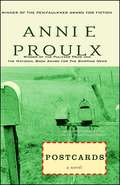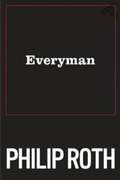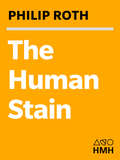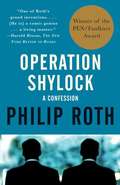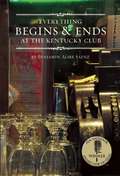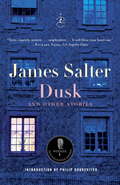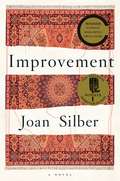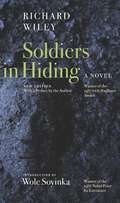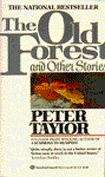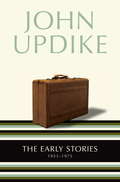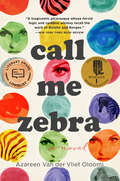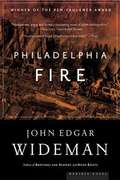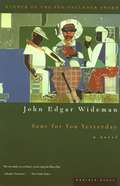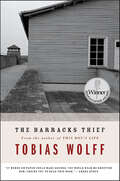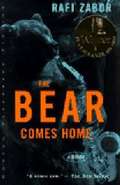Special Collections
PEN/Faulkner Award for Fiction
- Table View
- List View
Postcards
by Annie ProulxPulitzer Prize–winning author Annie Proulx's first novel, Postcards, tells the mesmerizing tale of Loyal Blood, who misspends a lifetime running from a crime so terrible that it renders him forever incapable of touching a woman. From the bestselling author of Brokeback Mountain comes Postcards, the tale of the Blood family, New England farmers who must confront the twentieth century—and their own extinction. As the family slowly disintegrates, its members struggle valiantly against the powerful forces of loneliness and necessity, seeking a sense of home and place forever lost. Loyal Blood, eldest son, is forced to abandon the farm when he takes his lover's life, thus beginning a quintessentially American odyssey of solitude and adventure. Yearning for love, yet forced by circumstance to be always alone, Loyal comes to symbolize the alienation and frustration behind the American dream.
Everyman
by Philip RothPhilip Roth's new novel is a candidly intimate yet universal story of loss, regret, and stoicism. The best-selling author of The Plot Against America now turns his attention from "one family's harrowing encounter with history" (New York Times) to one man's lifelong skirmish with mortality.
The fate of Roth's everyman is traced from his first shocking confrontation with death on the idyllic beaches of his childhood summers, through the family trials and professional achievements of his vigorous adulthood, and into his old age, when he is rended by observing the deterioration of his contemporaries and stalked by his own physical woes.
A successful commercial artist with a New York ad agency, he is the father of two sons from a first marriage who despise him and a daughter from a second marriage who adores him. He is the beloved brother of a good man whose physical well-being comes to arouse his bitter envy, and he is the lonely ex-husband of three very different women with whom he's made a mess of marriage. In the end he is a man who has become what he does not want to be.
The terrain of this powerful novel -- Roth's twenty-seventh book and the fifth to be published in the twenty-first century -- is the human body. Its subject is the common experience that terrifies us all.
Everyman takes its title from an anonymous fifteenth-century allegorical play, a classic of early English drama, whose theme is the summoning of the living to death.
The Human Stain
by Philip RothIt is 1998, the year in which America is whipped into a frenzy of prurience by the impeachment of a president, and in a small New England town, an aging classics professor, Coleman Silk, is forced to retire when his colleagues decree that he is a racist. The charge is a lie, but the real truth about Silk would have astonished his most virulent accuser. Coleman Silk has a secret. But it's not the secret of his affair, at seventy-one, with Faunia Farley, a woman half his age with a savagely wrecked past - a part-time farmhand and a janitor at the college where, until recently, he was the powerful dean of faculty. And it's not the secret of Coleman's alleged racism, which provoked the college witch-hunt that cost him his job and, to his mind, killed his wife. Nor is it the secret of misogyny, despite the best efforts of his ambitious young colleague, Professor Delphine Roux, to expose him as a fiend. Coleman's secret has been kept for fifty years: from his wife, his four children, his colleagues, and his friends, including the writer Nathan Zuckerman, who sets out to understand how this eminent, upright man, esteemed as an educator for nearly all his life, had fabricated his identity and how that cannily controlled life came unraveled. Set in 1990s America, where conflicting moralities and ideological divisions are made manifest through public denunciation and rituals of purification, The Human Stain concludes Philip Roth's eloquent trilogy of postwar American lives that are as tragically determined by the nation's fate as by the "human stain" that so ineradicably marks human nature. This harrowing, deeply compassionate, and completely absorbing novel is a magnificent successor to his Vietnam-era novel, American Pastoral, and his McCarthy-era novel, I MARRIED A COMMUNIST.
Operation Shylock
by Philip RothPhilip Roth meets a man who may or may not be Philip Roth. Because someone with that name has been touring Israel, promoting a strange reverse escape of the Jews. Roth is intent on stopping him, even if that means impersonating his own imitator.
Everything Begins and Ends at the Kentucky Club
by Benjamin Alire SáenzWinner of the 2013 PEN/Faulkner Award for Fiction!
Benjamin Alire Sáenz's stories reveal how all borders--real, imagined, sexual, human, the line between dark and light, addict and straight--entangle those who live on either side. Take, for instance, the Kentucky Club on Avenida Juárez two blocks south of the Rio Grande. It's a touchstone for each of Sáenz's stories. His characters walk by, they might go in for a drink or to score, or they might just stay there for a while and let their story be told. Sáenz knows that the Kentucky Club, like special watering holes in all cities, is the contrary to borders. It welcomes Spanish and English, Mexicans and gringos, poor and rich, gay and straight, drug addicts and drunks, laughter and sadness, and even despair. It's a place of rich history and good drinks and cold beer and a long polished mahogany bar. Some days it smells like piss. "I'm going home to the other side." That's a strange statement, but you hear it all the time at the Kentucky Club.
Benjamin Alire Sáenz is a highly regarded writer of fiction, poetry, and children's literature. Like these stories, his writing crosses borders and lands in our collective psyche. Poets & Writers Magazine named him one of the fifty most inspiring writers in the world. He's been a finalist for the Los Angeles Times Book Prize and PEN Center's prestigious award for young adult fiction. Sáenz is the chair of the creative writing department of University of Texas at El Paso.
Dusk and Other Stories
by James SalterJames Salter is an author with an impassioned following among contemporary readers, writers, and critics, and Dusk and Other Stories is among his signal achievements. First published nearly a quarter-century ago, and one of the very few short-story collections to win the PEN/Faulkner Award, this is American fiction at its most vital--each narrative a masterpiece of sustained power and seemingly effortless literary grace.
These stories chart the myriad moments and details that, taken together, shape a fate. Two New York attorneys newly flush with wealth embark on a dissolute tour of Italy. A divorced woman learns that she is about to lose the last thing of real value to her. An ambitious young screenwriter unexpectedly discovers the true meaning of art and glory. A rider, far off in the fields, is involved in an horrific accident—night is falling, and she must face her destiny alone.
Each of these stories is told with weighted calm, with a lingering mixture of precision and sudden revelation. They confirm James Salter as one of the finest writers of our time.
Improvement
by Joan SilberOne of our most gifted writers of fiction returns with a bold and piercing novel about a young single mother living in New York, her eccentric aunt, and the decisions they make that have unexpected implications for the world around them.
Reyna knows her relationship with Boyd isn't perfect, yet as she visits him throughout his three-month stint at Rikers Island, their bond grows tighter.
Kiki, now settled in the East Village after a journey that took her to Turkey and around the world, admires her niece's spirit but worries that she always picks the wrong man. Little does she know that the otherwise honorable Boyd is pulling Reyna into a cigarette smuggling scheme, across state lines, where he could risk violating probation.
When Reyna ultimately decides to remove herself for the sake of her four-year-old child, her small act of resistance sets into motion a tapestry of events that affect the lives of loved ones and strangers around them.
A novel that examines conviction, connection, and the possibility of generosity in the face of loss, Improvement is as intricately woven together as Kiki's beloved Turkish rugs, as colorful as the tattoos decorating Reyna's body, with narrative twists and turns as surprising and unexpected as the lives all around us.
Soldiers in Hiding
by Wole Soyinka and Richard WileyIt’s Tokyo, 1941. Teddy Maki and Jimmy Yakamoto are Japanese-American friends and jazz musicians playing Tokyo’s lively nightclub scene. Stranded in Japan after the bombing of Pearl Harbor, Teddy and Jimmy are drafted into the Japanese army and sent to fight against American troops in the Philippines. Their perilous attempts to remain neutral in a conflict where their loyalties are deeply divided are shattered when Jimmy is killed by the commanding officer for refusing to shoot an American prisoner. The deed then falls to Teddy. Thirty years later, Teddy is married to Jimmy’s widow, father to his son, a star on Japanese TV — and still wrestling with the guilt over Jimmy's death.
Winner of the 1987 PEN/Faulkner Award for Best American Fiction, Soldiers in Hiding is a haunting portrayal of war’s lingering emotional burdens. This revised edition features a new preface by the author and an introduction by Nobel Prize winner Wole Soyinka.
The Old Forest and Other Stories
by Peter TaylorA collection of marvelous stories featuring 14 stories set in the cities of the Deep South in the 1920s and 30s distinguished by penetrating psychological acuity and beautiful writing of the highest order by the Pulitzer Prize winning author of "A Summons to Memphis." The subjects are ordinary people -- families and households of the time -- caught in the extraordinary tensions of everyday life.
The Early Stories
by John UpdikeA harvest and not a winnowing, this volume collects 103 stories, almost all of the short fiction that John Updike wrote between 1953 and 1975. "How rarely it can be said of any of our great American writers that they have been equally gifted in both long and short forms," reads the citation composed for John Updike upon his winning the 2006 Rea Award for the Short Story. "Contemplating John Updike's monumental achievement in the short story, one is moved to think of Nathaniel Hawthorne, Henry James, Ernest Hemingway, and perhaps William Faulkner--writers whose reputations would be as considerable, or nearly, if short stories had been all that they had written. From [his] remarkable early short story collections . . . through his beautifully nuanced stories of family life [and] the bittersweet humors of middle age and beyond . . . John Updike has created a body of work in the notoriously difficult form of the short story to set beside those of these distinguished American predecessors. Congratulations and heartfelt thanks are due to John Updike for having brought such pleasure and such illumination to so many readers for so many years."
Call Me Zebra
by Azareen Van der Vliet OloomiWinner of the PEN/Faulkner Award for Fiction “Hearken ye fellow misfits, migrants, outcasts, squint-eyed bibliophiles, library-haunters and book stall-stalkers: Here is a novel for you.”—Wall Street Journal“A tragicomic picaresque whose fervid logic and cerebral whimsy recall the work of Bolaño and Borges.” —New York Times Book ReviewLonglisted for the PEN/Open Book Award * An Amazon Best Book of the Year * A Publishers Weekly BestsellerNamed a Best Book by: Entertainment Weekly, Harper's Bazaar, Boston Globe, Fodor's, Fast Company, Refinery29,Nylon, Los Angeles Review of Books, Book Riot, The Millions, Electric Literature, Bitch, Hello Giggles, Literary Hub, Shondaland, Bustle, Brit & Co., Vol. 1 Brooklyn,Read It Forward,Entropy Magazine,Chicago Review of Books, iBooks and Publishers Weekly Zebra is the last in a line of anarchists, atheists, and autodidacts. Alone and in exile, she leaves New York for Barcelona, retracing the journey she and her father made from Iran to the United States years ago. Books are her only companions—until she meets Ludo. Their connection is magnetic, and fraught. They push and pull across the Mediterranean, wondering if their love—or lust—can free Zebra from her past. Starring a heroine as quirky as Don Quixote, as brilliant as Virginia Woolf, as worldly as Miranda July, and as spirited as Lady Bird, Call Me Zebra is “hilarious and poignant, painting a magnetic portrait of a young woman you can’t help but want to know more about” (Harper’s Bazaar).
Philadelphia Fire
by John Edgar WidemanFrom "one of America's premier writers of fiction" (New York Times) comes this novel inspired by the 1985 police bombing of a West Philadelphia row house owned by the back-to-nature, Afrocentric cult known as Move.
The bombing killed eleven people and started a fire that destroyed sixty other houses.
At the center of the story is Cudjoe, a writer and exile who returns to his old neighborhood after spending a decade fleeing from his past, and his search for the lone survivor of the fire - a young boy who was seen running from the flames.
Sent for You Yesterday
by John Edgar WidemanThe novel tells the story of Albert Wilkes, who after seven years on the run, returns to Homewood, an African American neighborhood of the East End.
The Barracks Thief
by Tobias WolffThe Barracks Thief is the story of three young paratroopers waiting to be shipped out to Vietnam. Brought together one sweltering afternoon to stand guard over an ammunition dump threatened by a forest fire, they discover in each other an unexpected capacity for recklessness and violence. Far from being alarmed by this discovery, they are exhilarated by it; they emerge from their common danger full of confidence in their own manhood and in the bond of friendship they have formed.This confidence is shaken when a series of thefts occur. The author embraces the perspectives of both the betrayer and the betrayed, forcing us to participate in lives that we might otherwise condemn, and to recognize the kinship of those lives to our own.
The Bear Comes Home
by Rafi ZaborAn alto-sax virtuoso is trying to evolve a personal style out of Coltrane and Rollins. He also happens to be a walking, talking, Blake- and Shakespeare-quoting bear whose musical, spiritual, and romantic adventures add up to the novel.
